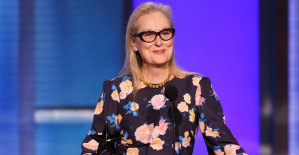Goldein has shown that female participation in the labor market did not trend upward over a 200-year period, but instead forms a U-shaped curve.
The participation of married women decreased during the transition from an agrarian to an industrial society at the beginning of the 19th century, but then began to increase in parallel with the development of the service sector at the beginning of the last century. Goldin explains this pattern as "the result of structural change and evolving social norms regarding the responsibilities attributed to women in the home and family based on history and culture."
Claudia Goldin "reviewed existing archives, compiled and analyzed relevant historical data that have been able to establish new and often surprising conclusions," the Nobel Committee notes in a statement.
"Her work has given us a deeper understanding of the factors that affect women's opportunities in the labor market and the demand for female labor." The teacher celebrates the recognition on X, formerly Twitter, pointing out that she "always wanted to be a detective, and I finally got it."
"It is a fact that women's decisions have often been, and continue to be, limited by marriage and domestic responsibilities," the Committee continues, "and the family is at the center of their analyzes and explanatory models. The studies Goldin's studies have also taught us that change takes time, because decisions that affect women's entire careers are often constrained by false expectations.
"Despite modernization, economic growth and the increase in the proportion of women employed in the 20th century, for a long period of time the wage gap between women and men has barely closed," she explains. "This is partly because educational decisions, which impact a lifetime of career opportunities, are decided and directed at a relatively early age."
"And if young women's expectations are still shaped by the experiences of previous generations (for example, their mothers, who have seen them stop working and not return to work until their children are older), it will impact their careers and social and labor change will be slower.
"Throughout the 20th century, women's education levels have increased considerably and in most high-income countries they are now substantially higher than men's. Goldin demonstrated with her studies that, in this context, access to The contraceptive pill in the last two or three decades of the last century played a crucial role in accelerating this revolutionary change, as it offered new opportunities for family and professional planning," continues the organization, based in Oslo.
"His ideas reach far beyond the borders of the United States: similar patterns have been observed in many other countries. His research gives us a better understanding of the labor markets of yesterday, today and tomorrow."
Goldin has received numerous awards, including the Frontiers of Knowledge Award in the Economics category, awarded by the BBVA Foundation in 2019.
The Nobel Prize in economics is the last of the awards that remained to be awarded this year after those for Peace, Literature, Chemistry, Physics and Medicine, among others.
Americans Ben Bernanke, Douglas Diamond and Philip Dybvig were awarded the Nobel Prize in Economics in 2022 last year for their studies on the role of banking and regulation in overcoming financial crises.
The Nobel Prize in Economics, like the rest, is endowed this year with 11 million Swedish crowns (almost a million dollars). The awards will be presented on December 10 in the traditional double ceremony in Oslo, for the Nobel Peace Prize, and in Stockholm, for the remaining five. The Nobel Prize in Economics is the only one of the six prizes not created by the Swedish magnate Alfred Nobel, but was established by the National Bank of Sweden (Riksbank) in 1968 and was awarded for the first time the following year.
In the 54 occasions on which it has been awarded - it has never been void, unlike the other five - it has distinguished 92 people, only two of them women: the American Elinor Ostrom (2009) and the French Esther Duflo (2019). It is, along with Physics, the only one that does not have winners from Spain or Latin America in its list of winners.

 What is chloropicrin, the chemical agent that Washington accuses Moscow of using in Ukraine?
What is chloropicrin, the chemical agent that Washington accuses Moscow of using in Ukraine? Poland, big winner of European enlargement
Poland, big winner of European enlargement In Israel, step-by-step negotiations for a ceasefire in the Gaza Strip
In Israel, step-by-step negotiations for a ceasefire in the Gaza Strip BBVA ADRs fall almost 2% on Wall Street
BBVA ADRs fall almost 2% on Wall Street Breast cancer: less than one in two French women follow screening recommendations
Breast cancer: less than one in two French women follow screening recommendations “Dazzling” symptoms, 5,000 deaths per year, non-existent vaccine... What is Lassa fever, a case of which has been identified in Île-de-France?
“Dazzling” symptoms, 5,000 deaths per year, non-existent vaccine... What is Lassa fever, a case of which has been identified in Île-de-France? Sánchez cancels his agenda and considers resigning: "I need to stop and reflect"
Sánchez cancels his agenda and considers resigning: "I need to stop and reflect" The Federal Committee of the PSOE interrupts the event to take to the streets with the militants
The Federal Committee of the PSOE interrupts the event to take to the streets with the militants The growth gap between Europe and the United States will narrow in 2025
The growth gap between Europe and the United States will narrow in 2025 A report recommends the creation of a “riot fund” to cover communities
A report recommends the creation of a “riot fund” to cover communities With 3.5 billion euros collected, life insurance recorded its best month in 10 years in March
With 3.5 billion euros collected, life insurance recorded its best month in 10 years in March Volvic factory shut down after “an act of malicious intent”: production can resume “at the earliest” on Friday
Volvic factory shut down after “an act of malicious intent”: production can resume “at the earliest” on Friday Jean Reno publishes his first novel Emma on May 16
Jean Reno publishes his first novel Emma on May 16 Cannes Film Festival: Meryl Streep awarded an honorary Palme d’Or
Cannes Film Festival: Meryl Streep awarded an honorary Palme d’Or With A Little Something Extra, Artus and his disabled actors do better than Intouchable on the first day
With A Little Something Extra, Artus and his disabled actors do better than Intouchable on the first day Madonna ends her world tour with a giant - and free - concert in Copacabana
Madonna ends her world tour with a giant - and free - concert in Copacabana Omoda 7, another Chinese car that could be manufactured in Spain
Omoda 7, another Chinese car that could be manufactured in Spain BYD chooses CA Auto Bank as financial partner in Spain
BYD chooses CA Auto Bank as financial partner in Spain Tesla and Baidu sign key agreement to boost development of autonomous driving
Tesla and Baidu sign key agreement to boost development of autonomous driving Skoda Kodiaq 2024: a 'beast' plug-in hybrid SUV
Skoda Kodiaq 2024: a 'beast' plug-in hybrid SUV The home mortgage firm rises 3.8% in February and the average interest moderates to 3.33%
The home mortgage firm rises 3.8% in February and the average interest moderates to 3.33% This is how housing prices have changed in Spain in the last decade
This is how housing prices have changed in Spain in the last decade The home mortgage firm drops 10% in January and interest soars to 3.46%
The home mortgage firm drops 10% in January and interest soars to 3.46% The jewel of the Rocío de Nagüeles urbanization: a dream villa in Marbella
The jewel of the Rocío de Nagüeles urbanization: a dream villa in Marbella Europeans: a senior official on the National Rally list
Europeans: a senior official on the National Rally list Blockade of Sciences Po: the right denounces a “drift”, the government charges the rebels
Blockade of Sciences Po: the right denounces a “drift”, the government charges the rebels Even on a mission for NATO, the Charles-de-Gaulle remains under French control, Lecornu responds to Mélenchon
Even on a mission for NATO, the Charles-de-Gaulle remains under French control, Lecornu responds to Mélenchon “Deadly Europe”, “economic decline”, immigration… What to remember from Emmanuel Macron’s speech at the Sorbonne
“Deadly Europe”, “economic decline”, immigration… What to remember from Emmanuel Macron’s speech at the Sorbonne These French cities that will boycott the World Cup in Qatar
These French cities that will boycott the World Cup in Qatar OM: scorer against Bergamo, Mbemba moved after the final whistle
OM: scorer against Bergamo, Mbemba moved after the final whistle OM-Atalanta: the lines of the match
OM-Atalanta: the lines of the match Ligue 1: Lorient supporters invade the training center
Ligue 1: Lorient supporters invade the training center Hand: Montpellier overthrown by Kiel in the Champions League
Hand: Montpellier overthrown by Kiel in the Champions League


















